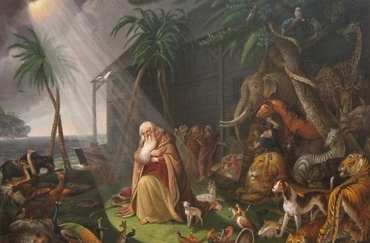1
At sinalita ng Panginoon kay Moises, na sinasabi,
2
Iutos mo sa mga anak ni Israel na dalhan ka ng langis na dalisay na oliva, na hinalo para sa ilawan, upang laging papagliyabin ang ilawan.
3
Sa labas ng tabing ng kaban ng patotoo sa tabernakulo ng kapisanan, ay aayusing palagi ni Aaron, mula sa hapon hanggang sa umaga sa harap ng Panginoon: siyang palatuntunan magpakailan man sa buong panahon ng inyong lahi.
4
Kanyang aayusin lagi ang mga ilawan sa ibabaw ng kandelerong dalisay sa harap ng Panginoon.
5
At kukuha ka ng mainam na harina, at magluluto ka niyan ng labing dalawang munting tinapay: tigdadalawang ikasampung bahagi ng isang epa ang bawa't munting tinapay.
6
At ilalagay mong dalawang hanay, anim sa bawa't hanay, sa ibabaw ng dulang na dalisay sa harap ng Panginoon.
7
At maglalagay ka sa bawa't hanay ng dalisay na kamangyan, upang ito'y maging paalaala na tinapay, na handog nga sa Panginoon na pinaraan sa apoy.
8
Sa bawa't sabbath ay aayusing palagi ang tinapay sa harap ng Panginoon; sa ganang mga anak ni Israel, na pinakatipang walang hanggan.
9
At magiging kay Aaron at sa kaniyang mga anak; at kanilang kakanin sa dakong banal: sapagka't kabanalbanalang bagay sa kaniya sa mga handog sa Panginoon na pinaraan sa apoy sa pamamagitan ng palatuntunang walang hanggan.
10
At ang anak na lalake ng isang babaing, Israelita na ang ama'y Egipcio, ay napasa gitna ng mga anak ni Israel: at nagbabag sa gitna ng kampamento ang anak ng babaing Israelita at ang isang lalake ni Israel.
11
At nilapastangan ng anak ng babaing Israelita ang Pangalan, at nilait: at siya'y kanilang dinala kay Moises, at ang pangalan ng kaniyang ina ay Selomith, na anak ni Dribi sa lipi ni Dan.
12
At siya'y kanilang inilagay sa bilangguan hanggang sa ang hatol ay ipahayag sa kanila ng bibig ng Panginoon.
13
At sinalita ng Panginoon kay Moises, na sinasabi,
14
Dalhin mo ang mapaglait sa labas ng kampamento; at ang lahat ng nakarinig sa kaniya ay magpatong ng kanilang mga kamay sa kaniyang ulo, at pagbatuhanan siya ng buong kapisanan.
15
At sasalitain mo sa mga anak ni Israel, na iyong sasabihin, Sinomang mapanungayaw sa kaniyang Dios ay magpapasan ng kaniyang sala.
16
At ang lumapastangan sa pangalan ng Panginoon ay papataying walang pagsala; walang pagsalang pagbabatuhanan siya ng buong kapisanan: maging taga ibang lupa o maging tubo sa lupain, ay papatayin pagka lumapastangan sa Pangalan ng Panginoon.
17
At ang manakit ng malubha sa kanino mang tao, ay papataying walang pagsala;
18
At ang manakit ng malubha sa isang hayop ay magpapalit: hayop kung hayop.
19
At kung ang sinoman ay makasakit sa kaniyang kapuwa: ayon sa ginawa niya ay gayon ang gagawin sa kaniya;
20
Bugbog kung bugbog, mata kung mata, ngipin kung ngipin: ayon sa kaniyang pagkasakit sa tao, ay gayon din ang gagawin sa kaniya.
21
At ang pumatay ng isang hayop ay magpapalit, at ang pumatay sa isang tao ay papatayin.
22
Magkakaroon kayo ng isa lamang kautusan sa taga ibang bayan, na gaya sa tubo sa lupain: sapagka't ako ang Panginoon ninyong Dios.
23
At nagsalita si Moises sa mga anak ni Israel at siya na nanglait ay inilabas nila sa kampamento, at siya'y pinagbatuhanan ng mga bato. At ginawa ng mga anak ni Israel, ayon sa iniutos ng Panginoon kay Moises.







